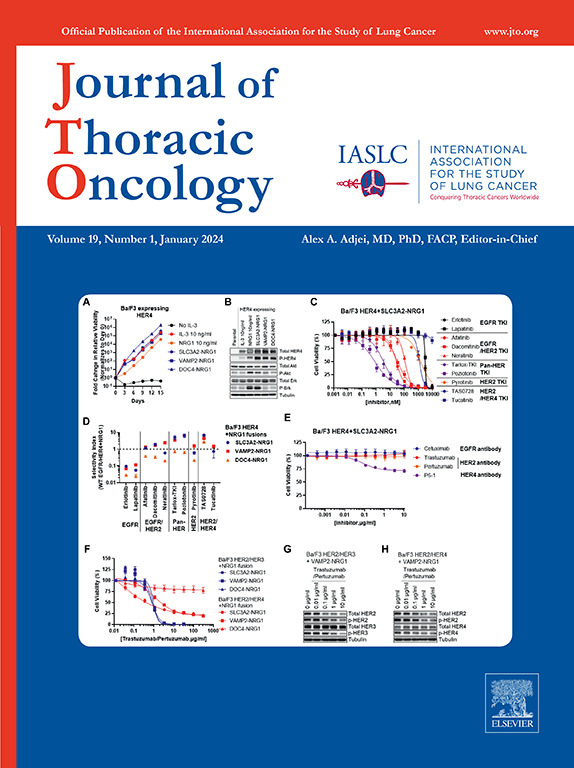Safety, Efficacy, and Biomarker Analysis of Deulorlatinib (TGRX-326) in Anaplastic Lymphoma Kinase-Positive NSCLC: A Multicenter, Open-Label, Phase 1/1b Trial
IF 20.8
1区 医学
Q1 ONCOLOGY
引用次数: 0
Abstract
Introduction
Patients with anaplastic lymphoma kinase (ALK)–positive NSCLC developing resistance to second-generation inhibitors have limited treatment options. Deulorlatinib is a highly brain-penetrant, new-generation ALK/ROS1 inhibitor. We evaluated the safety, efficacy, and pharmacokinetics of deulorlatinib in ALK-positive NSCLC.
Methods
This three-part (dose-escalation/dose-expansion/cohort-expansion), open-label, phase 1/1b trial was conducted at 22 sites in the People’s Republic of China (ClinicalTrials.gov, NCT05441956). Patients who were eligible had advanced ALK/ROS1-positive NSCLC. Patients enrolled in dose-escalation/dose-expansion parts were previously treated with one or more second-generation ALK inhibitors (ALK-positive) or crizotinib (ROS1-positive) and received deulorlatinib 5 to 125 mg once per day. Patients enrolled in cohort-expansion parts were either crizotinib-treated, second-generation tyrosine kinase inhibitor (TKI)–treated, or TKI-naïve; and received deulorlatinib at the recommended phase 2 dose (RP2D). The primary outcomes were safety and tolerability. Here, we report safety analysis in all patients and efficacy analysis in patients who were ALK-positive.
Results
Between April 2021 and March 2023, 198 patients were enrolled (ALK-positive = 171, ROS1-positive = 27). The most common treatment-related adverse events (TRAEs) were hypercholesterolemia (79.3%), hypertriglyceridemia (77.3%), and weight gain (53.0%). 40.4% of patients had grade 3 or higher TRAEs. Meanwhile, TRAE-associated dose interruptions, reduction, and discontinuation occurred in 11.1%, 3.0%, and 1.5% of patients, respectively. The RP2D was set at 60 mg once per day. A total of 144 patients who were ALK-positive were treated at RP2D. For crizotinib-treated (n = 14), second-generation TKI-treated (n = 97), and TKI-naïve (n = 33) patients, the objective response rate to deulorlatinib at RP2D was 71.4%, 38.1%, and 87.9%, respectively. Intracranial objective response rate was 50%, 70.4%, and 75%, respectively. The median duration of response was 18.0 months for second-generation TKI-treated patients, and not reached for patients who were crizotinib-treated and TKI-naïve. Biomarker analyses identified undetectable ALK alterations at baseline and ALK circulating tumor DNA clearance at week 6 as potential predictive biomarkers.
Conclusions
Deulorlatinib reported desirable tolerability and efficacy in ALK-positive NSCLC, demonstrating the potential to become a new treatment option in this population.
ALK阳性非小细胞肺癌患者服用deulorlatinib(TGRX-326)的安全性、疗效和生物标志物分析:一项多中心、开放标签、1/1b期试验。
简介:对第二代抑制剂产生耐药性的ALK阳性NSCLC患者的治疗选择非常有限。德洛拉替尼是一种高度脑穿透性的新一代ALK/ROS1抑制剂。我们评估了德欧拉替尼在ALK阳性NSCLC中的安全性、有效性和药代动力学:这项由三部分组成(剂量递增/剂量扩增/皮质扩增)、开放标签、1/1b 期试验在中国 22 个地点进行(ClinicalTrials.gov,NCT05441956)。符合条件的患者均为 ALK/ROS1 阳性的晚期 NSCLC。入组剂量递增/剂量扩增部分的患者既往接受过≥1种第二代ALK抑制剂(ALK阳性)或克唑替尼(ROS1阳性)治疗;接受每日1次、每次5-125毫克的deulorlatinib治疗。加入队列扩展部分的患者要么接受过克唑替尼治疗,要么接受过第二代TKI治疗,要么TKI治疗无效;接受推荐的2期剂量(RP2D)的deulorlatinib治疗。主要结果是安全性和耐受性。在此,我们报告所有患者的安全性分析和ALK阳性患者的疗效分析:2021年4月至2023年3月期间,共有198例患者入组(ALK阳性=171例,ROS1阳性=27例)。最常见的治疗相关不良事件(TRAEs)为高胆固醇血症(79.3%)、高甘油三酯血症(77.3%)和体重增加(53.0%)。40.4%的患者出现≥3级TRAE。分别有11.1%、3.0%和1.5%的患者出现与TRAE相关的剂量中断、减少和中止。RP2D设定为60毫克,每日一次。共有144名ALK阳性患者接受了RP2D治疗。在克唑替尼治疗(14例)、第二代TKI治疗(97例)和TKI治疗无效(33例)的患者中,RP2D时去氯拉替尼的ORR分别为71.4%、38.1%和87.9%。颅内ORR分别为50%、70.4%和75%。第二代TKI治疗患者的中位应答持续时间为18.0个月,克唑替尼治疗和TKI治疗无效患者的中位应答持续时间未达到18.0个月。生物标志物分析发现,基线检测不到的ALK改变和第6周的ALK ctDNA清除率是潜在的预测性生物标志物:德洛拉替尼在ALK阳性NSCLC患者中显示出理想的耐受性和疗效,表明它有可能成为该人群的一种新的治疗选择。
本文章由计算机程序翻译,如有差异,请以英文原文为准。
求助全文
约1分钟内获得全文
求助全文
来源期刊

Journal of Thoracic Oncology
医学-呼吸系统
CiteScore
36.00
自引率
3.90%
发文量
1406
审稿时长
13 days
期刊介绍:
Journal of Thoracic Oncology (JTO), the official journal of the International Association for the Study of Lung Cancer,is the primary educational and informational publication for topics relevant to the prevention, detection, diagnosis, and treatment of all thoracic malignancies.The readship includes epidemiologists, medical oncologists, radiation oncologists, thoracic surgeons, pulmonologists, radiologists, pathologists, nuclear medicine physicians, and research scientists with a special interest in thoracic oncology.
 求助内容:
求助内容: 应助结果提醒方式:
应助结果提醒方式:


